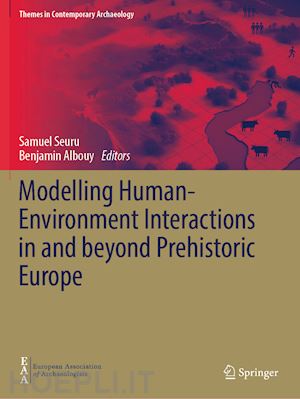
Questo prodotto usufruisce delle SPEDIZIONI GRATIS
selezionando l'opzione Corriere Veloce in fase di ordine.
Pagabile anche con Carta della cultura giovani e del merito, 18App Bonus Cultura e Carta del Docente
This book offers insight into the relationship between prehistoric and protohistoric human populations and the world around them. It reconstructs key aspects of the palaeoenvironment – from large-scale drivers of environmental conditions, such as climate, to more regional variables such as vegetation cover and faunal communities. The volume underscores how computational archaeology is leading the way in the study of past human-environment interactions across spatial and chronological scales.
With the increased availability of high-resolution climate models, agent-based modelling, palaeoecological proxies and the mature use of Geographic Information System in ecological modelling, archaeologists working in interdisciplinary settings are well-positioned to explore the intersection of human systems and environmental affordances and constraints. These methodological advancements provide a better understanding of the role humans played in past ecosystems – both in terms of their impact upon the environment and, in return, the impact of environmental conditions on human systems. They may also allow us to infer past ecological knowledge and land-use patterns that are historically contingent, rather than environmentally determined. This volume gathers contributions that combine reconstructions of past environments and archeological data with a view to exploring their complex interactions at different scales and invites scholars from varying disciplines and backgrounds to present and compare different modelling approaches.
Benjamin Albouy is a Ph.D. candidate in the Department of Anthropology, University of Montreal, Canada. His research explores the relationship between Neanderthals and their environment. In his doctoral thesis, he is studying the impact of abrupt climate change on the last Neanderthal populations in Europe.











Il sito utilizza cookie ed altri strumenti di tracciamento che raccolgono informazioni dal dispositivo dell’utente. Oltre ai cookie tecnici ed analitici aggregati, strettamente necessari per il funzionamento di questo sito web, previo consenso dell’utente possono essere installati cookie di profilazione e marketing e cookie dei social media. Cliccando su “Accetto tutti i cookie” saranno attivate tutte le categorie di cookie. Per accettare solo deterninate categorie di cookie, cliccare invece su “Impostazioni cookie”. Chiudendo il banner o continuando a navigare saranno installati solo cookie tecnici. Per maggiori dettagli, consultare la Cookie Policy.